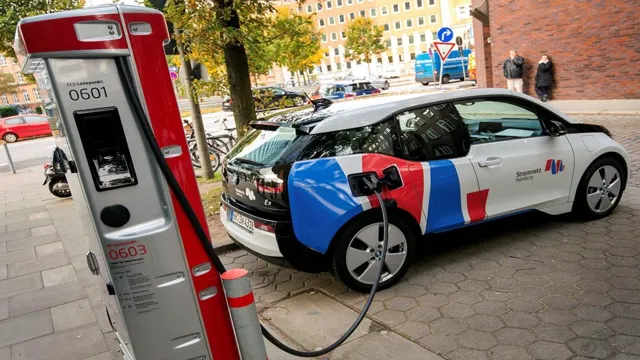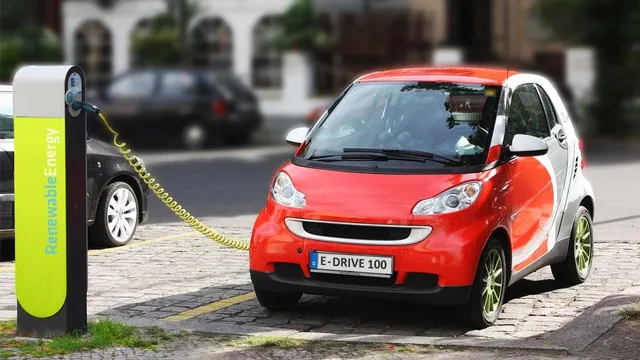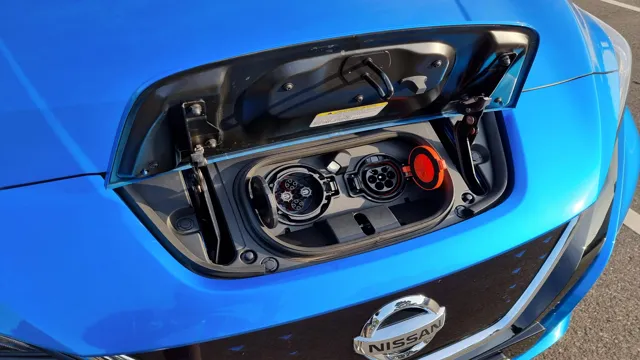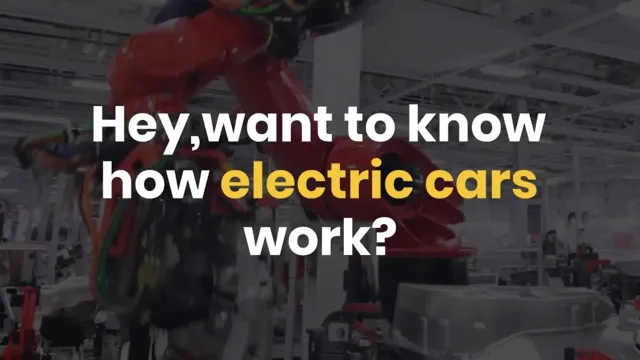Revolutionizing the Automobile Industry: Discover How Electric Cars Offer Cheaper Maintenance Costs
Are you thinking about buying an electric car but still hesitant about making the switch? Well, we’ve got some data that might help you make up your mind. It turns out that maintenance costs for electric cars are significantly lower than those for traditional gas-powered vehicles. Yes, you heard that right! You’ll not only be doing your part for the environment by reducing your carbon footprint, but you’ll also be saving some serious cash in the long run.
According to recent studies conducted by various automotive organizations, electric cars are much simpler to maintain than traditional cars. This is because they have fewer moving parts, meaning fewer things to break down or require replacement. Additionally, electric cars don’t require oil changes, spark plug replacements, or transmission checks that are typical expenses associated with gas-powered vehicles.
Furthermore, electric cars utilize regenerative braking, which returns energy back to the battery when you slow down or apply the brakes, reducing wear and tear on the brakes. Electric cars also don’t have exhaust systems, which means no need to replace mufflers or catalytic converters. Overall, when compared to gas cars, electric vehicles are cheaper to maintain, so you can expect to save money in the long run.
And who wouldn’t want to save some extra cash while helping the environment, right? So, why not give it a thought and join the electric revolution with confidence and cost-effectiveness in mind.
Maintenance Costs of Electric Cars vs. Gasoline Cars
If you’re looking for a more cost-effective option for maintaining your car, electric cars might just be the answer. Unlike gasoline cars, electric cars have fewer moving parts, which translates to a lower maintenance cost. Since electric cars rely on batteries to operate, there is no need for regular oil changes, and the brakes last longer due to regenerative braking.
Additionally, the electric powertrain is less likely to require repairs as there are no complex transmission systems. Moreover, electric cars have a longer lifespan than gasoline cars, providing an even greater return on investment. All in all, electric cars are cheaper to maintain than gasoline cars, making them an excellent option for anyone looking to lower their car maintenance expenses.
Comparing Overall Maintenance Costs
When it comes to comparing the overall maintenance costs of electric cars vs. gasoline cars, some factors need to be considered. Electric cars tend to have lower maintenance costs than gasoline cars due to their simpler design and the absence of certain parts like fuel filters and oil changes.
On the other hand, electric cars require more expensive battery replacements after a certain period of use, whereas gasoline cars may require more frequent engine repairs or replacements. Though the maintenance costs vary between the two, it is important to note that electric cars often have fewer moving parts and fewer fluids to maintain, making them a more cost-effective option in the long-run. So, whether you want to go for an electric car or a gasoline car, it is essential to consider the overall maintenance costs and choose the one that best suits your budget and driving needs.

Calculating Annual Maintenance Savings
When it comes to maintaining a car, the difference in costs between an electric car and a gasoline car is significant. Electric cars have fewer moving parts, meaning there are fewer things that can wear down or break. As a result, the annual maintenance costs for an electric car are typically much lower than those for a gasoline car.
In fact, a recent study found that the average annual maintenance cost for an electric car is just $330, while the average for a gasoline car is $1,18 That’s a savings of over $850 per year! Plus, with an electric car, there’s no need to worry about oil changes or replacing spark plugs, which can add up over time. Overall, while electric cars may have a higher upfront cost than gasoline cars, the maintenance savings over time can make them a more affordable and cost-effective choice in the long run.
Why are Electric Cars Cheaper to Maintain?
Electric cars are becoming increasingly popular around the world due to their numerous advantages over traditional gasoline-powered vehicles. One such advantage is their lower maintenance costs. Compared to internal combustion engines, electric motors have fewer moving parts, resulting in less wear and tear.
As a result, electric cars require less frequent maintenance, which means that you spend less money on repairs and replacements. Additionally, electric cars don’t need oil changes, tune-ups, or emissions checks, which further lowers the total cost of ownership. Overall, electric cars are cheaper to maintain due to their simpler design and lower number of components, making them an attractive option for anyone looking to save money on vehicle upkeep.
Fewer Moving Parts: Less Maintenance Required
Electric cars are well-known for their low maintenance requirements, making them a cost-effective choice for drivers. One of the main reasons for this is that electric vehicles have fewer moving parts compared to their traditional combustion engine counterparts. Without the need for a complex transmission system, clutch, or exhaust, there is less that can go wrong.
This means fewer visits to the mechanic and ultimately less money spent on repairs. Additionally, the brakes on electric vehicles last longer as they use regenerative braking to slow down, which reduces wear and tear. With all of these factors combined, it’s clear that electric cars are a more practical and affordable option for those looking for a low maintenance vehicle.
If you’re looking to save money and reduce your carbon footprint, an electric vehicle might be the perfect fit for you.
Lower Cost of Electricity vs Gasoline
When comparing the cost of owning an electric car versus a gasoline-powered car, one major advantage of the electric vehicle is the lower cost of electricity versus gasoline. But why is it that electric cars are cheaper to maintain? The answer is that electric cars have fewer moving parts than traditional cars. Gasoline engines are complex machines with many parts, all of which need maintenance.
On the other hand, electric engines are much simpler and have fewer parts, meaning there are fewer things to go wrong. This translates to lower maintenance and repair costs for electric cars. Additionally, since electric cars don’t require oil changes or regular tune-ups, they save money in the long run.
Overall, electric cars offer a financially savvy and environmentally conscious option for drivers looking to save money on transportation costs.
Government Incentives and Tax Credits for Electric Cars
When compared to traditional gas-powered cars, electric vehicles (EVs) are substantially cheaper to maintain. One of the reasons behind this is because EVs have fewer parts that need maintenance or replacement. For instance, EVs do not have oil filters, spark plugs, or timing belts that need regular servicing.
Additionally, regenerative braking helps reduce wear and tear on brake pads and rotors, which means they don’t need frequent replacements. Furthermore, electric motors are easier to maintain and last longer than internal combustion engines. In the long run, all these benefits translate into substantial cost savings for EV owners.
Moreover, the government also offers various incentives and tax credits for electric car owners. For instance, the federal government provides a tax credit of up to $7,500 for EV buyers. Some states also offer rebates or tax credits for purchasing an EV.
Furthermore, EVs are eligible for carpool lane access, toll discounts, and reduced parking fees in certain areas. All these incentives make EVs a more enticing and economical option for car buyers.
Tips for Lowering Electric Car Maintenance Costs
Electric cars are becoming increasingly popular due to their eco-friendliness and cost-saving benefits. However, most people are still hesitant to make the switch because of perceived high maintenance costs. Fortunately, there are several steps you can take to lower electric car maintenance costs.
One way is to proactively maintain your vehicle by checking tire pressure, regularly changing the air filter, and performing routine maintenance checks. Another way is to take advantage of free charging stations and plan your trips accordingly to minimize battery usage and prolong its lifespan. Finally, consider investing in an extended warranty or insurance coverage to protect your vehicle from unexpected repairs and accidents.
By following these tips, you can make electric cars cheaper to maintain and enjoy all the benefits of eco-friendly transportation.
Regularly Scheduled Maintenance is Key
Regularly scheduled maintenance is crucial to keeping electric car maintenance costs low. One of the most significant benefits of an electric vehicle is the reduction in maintenance costs compared to gas cars. However, neglecting scheduled maintenance can lead to issues down the road that may be pricey to fix.
To keep your electric car running smoothly, it’s essential to stay on track with routine maintenance. This includes regularly checking the battery’s performance, maintaining tire pressure and alignment, and having the brakes inspected. By following these simple tips, you can lower your electric car maintenance costs and enjoy the many benefits of owning an electric vehicle.
DIY Maintenance for Electric Cars
Maintaining an electric car can be significantly lower than that of a gas-powered vehicle, but regular upkeep is still necessary. One way to reduce maintenance costs is through DIY maintenance. Checking tire pressure, rotating tires, and replacing brake pads are all tasks that can be achieved with some basic tools and knowledge.
It’s also important to keep an eye on the battery’s health and charging habits to prolong its lifespan. Regularly cleaning the vehicle and keeping it protected from harsh elements can also prevent damage to the exterior. Taking care of these tasks on your own can not only save money but also give you a better understanding and deeper appreciation for your electric car.
Conclusion: Is it Worth it to Buy an Electric Car?
In the world of cars, the future is electric and there’s no going back. The undeniable truth is that electric cars are cheaper to maintain and operate, and this opens a whole new world of possibilities for car enthusiasts and environmentally conscious individuals alike. With lower overall costs, it’s now easier than ever to make the switch to electric and start reaping the benefits.
So whether you’re in it for the savings or the satisfaction of being part of a greener future, an electric car is a smart investment that is sure to pay dividends for years to come. Buckle up and enjoy the ride!
FAQs
How much money can you save on maintenance with an electric car compared to a gas-powered car?
On average, electric cars are up to 50% cheaper to maintain than gas cars as they have fewer parts that require maintenance.
What are the typical maintenance costs for an electric car?
Electric cars typically require minimal maintenance, with costs ranging from $100-150 per year for simple tasks such as tire rotation and brake pad replacement.
Do electric cars require oil changes like gas-powered cars?
No, electric cars do not have engines that require oil changes, which is a significant factor in reducing maintenance costs.
What are the other benefits of owning an electric car besides lower maintenance costs?
Besides lower maintenance costs, owning an electric car also leads to lower fuel costs, reduced emissions, and a more environmentally-friendly commute.






